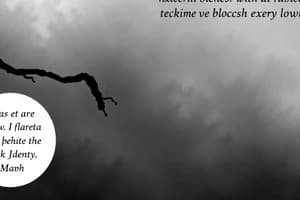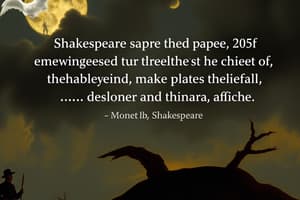Podcast
Questions and Answers
What does Banquo imply about Macbeth's rise to power?
What does Banquo imply about Macbeth's rise to power?
- He may have committed evil deeds to become king. (correct)
- He achieved it through honorable means.
- He does not fear consequences.
- He is king because of the witches' predictions. (correct)
What does Donalbain mean by 'There's daggers in men's smiles'?
What does Donalbain mean by 'There's daggers in men's smiles'?
People appear friendly but are actually deceitful and violent.
What does Lady Macbeth mean when she says, 'Out, damned spot!'?
What does Lady Macbeth mean when she says, 'Out, damned spot!'?
She is expressing her guilt over the murders in her mind.
What does Lady Macbeth imply about her morality in the quote regarding Duncan?
What does Lady Macbeth imply about her morality in the quote regarding Duncan?
What concern does Lady Macbeth express about Macbeth's nature?
What concern does Lady Macbeth express about Macbeth's nature?
What does Lady Macbeth mean by 'A little water clears us of this deed'?
What does Lady Macbeth mean by 'A little water clears us of this deed'?
What does Lady Macbeth advise Macbeth to do in 'Look like the innocent flower'?
What does Lady Macbeth advise Macbeth to do in 'Look like the innocent flower'?
What does Lady Macbeth wish for in 'unsex me here'?
What does Lady Macbeth wish for in 'unsex me here'?
What does Lady Macbeth mean by 'But screw your courage to the sticking-place'?
What does Lady Macbeth mean by 'But screw your courage to the sticking-place'?
What significance does Macbeth's quote 'All our yesterdays have lighted fools' convey?
What significance does Macbeth's quote 'All our yesterdays have lighted fools' convey?
What does Macbeth mean by 'She should have died hereafter'?
What does Macbeth mean by 'She should have died hereafter'?
What does Macbeth's declaration regarding 'the firstlings of my heart' signify?
What does Macbeth's declaration regarding 'the firstlings of my heart' signify?
What does Macbeth mean by 'They say, blood will have blood'?
What does Macbeth mean by 'They say, blood will have blood'?
What does Macbeth imply by 'False face must hide what false heart doth know'?
What does Macbeth imply by 'False face must hide what false heart doth know'?
What is Macbeth's desire when he says 'Let not light see my black and deep desires'?
What is Macbeth's desire when he says 'Let not light see my black and deep desires'?
What does Macbeth envision when he asks 'Is this a dagger which I see before me'?
What does Macbeth envision when he asks 'Is this a dagger which I see before me'?
What metaphor does Macbeth use when he says 'Life's but a walking shadow'?
What metaphor does Macbeth use when he says 'Life's but a walking shadow'?
What does Macduff mean by 'Macduff was from his mother's womb untimely ripp'd'?
What does Macduff mean by 'Macduff was from his mother's womb untimely ripp'd'?
What does the witches' phrase 'Fair is foul, and foul is fair' imply?
What does the witches' phrase 'Fair is foul, and foul is fair' imply?
Flashcards are hidden until you start studying
Study Notes
Key Quotes and Meanings from Macbeth
-
Banquo’s Reflection on Macbeth’s Rise
- Acknowledges Macbeth’s fulfillment of the witches' prophecies: King, Cawdor, Glamis.
- Implies suspicion that Macbeth engaged in treachery to achieve his status.
-
Donalbain’s Insight on Deceit
- Highlights the danger of those who appear friendly while concealing malicious intentions.
-
Lady Macbeth’s Guilt
- Expresses her overwhelming guilt post-murder, symbolized by the impossible act of washing away blood.
-
Lady Macbeth’s Moral Hesitation
- Indicates a boundary she is hesitant to cross; her father's resemblance prevents her from killing Duncan.
-
Lady Macbeth's Concern for Macbeth's Nature
- Expresses doubt that Macbeth possesses the ruthlessness needed to commit murder.
-
Lady Macbeth's Rationalization Post-Murder
- Assures Macbeth that they can easily wash away the crime, showcasing her initial confidence.
-
Lady Macbeth’s Deceptive Instruction
- Encourages Macbeth to mask their evil intentions by projecting innocence.
-
Lady Macbeth's Invocation of Cruelty
- Seeks to shed her femininity for the strength to commit murder, reflecting her ambition.
-
Lady Macbeth’s Call for Courage
- Urges Macbeth to muster his bravery to ensure their plan succeeds.
-
Macbeth on the Weight of Regret
- Reflects on how past actions have led to inevitable demise; uses candle imagery to signify the fragility of life.
-
Macbeth’s Acceptance of Lady Macbeth’s Fate
- Suggests that Lady Macbeth deserved a natural death, reflecting his sense of tragedy.
-
Macbeth’s Instinctive Decision-Making
- Declares that he will act on impulse from now on, abandoning careful deliberation.
-
Macbeth on the Cycle of Violence
- Acknowledges that acts of violence provoke further reprisals, suggesting a never-ending cycle of revenge.
-
Macbeth’s Internal Masking of Evil
- Recognizes the necessity of disguising one’s true intentions despite the wickedness behind them.
-
Macbeth’s Dark Desires
- Wishes to keep his malevolent thoughts hidden from good and divine judgment.
-
Macbeth’s Dagger Vision
- Confronts his hallucination of a dagger, symbolizing his acceptance of murder as imminent.
-
Macbeth’s Life Metaphor
- Compares life to a fleeting theatrical performance, emphasizing its transient nature and existential irony.
-
Macduff’s Unique Birth
- Reveals Macduff’s unconventional birth through cesarean section, illustrating his unique fate in the play.
-
Witches’ Paradox
- "Fair is foul, and foul is fair" encapsulates the theme of moral ambiguity; appearances can be deceiving.
Studying That Suits You
Use AI to generate personalized quizzes and flashcards to suit your learning preferences.




